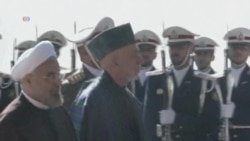WASHINGTON —
Amid a dispute with the United States over a long-term security deal, Afghanistan is pursuing closer ties with neighboring Iran. The diplomacy could signal an increasing regional role for Tehran in Afghan affairs after most international troops leave Afghanistan in 2014.
When Afghan President Hamid Karzai recently visited Tehran, he received support for his delay in signing a security pact with the U.S. that would keep some American troops in Afghanistan beyond 2014.
To some experts, the move shows that Kabul is willing to let its neighbors have a stake in regional security.
Thomas Lynch, an analyst for Washington’s National Defense University, said, "As we come into 2014, there is this approach to try to find a more regional solution to the problems of violence in this part of the world. And there is interest that the United States has in this, as well, as the Iranians and Afghans."
But some experts warn that, if Karzai fails to finalize a deal with the U.S. and all international troops leave next year, Afghanistan's neighbors could be more a hindrance than a help.
Ahmad Majidyar, with Washington’s American Enterprise Institute, said, "The Afghan government and the United States have not finalized the security agreement. And if all the U.S. and NATO troops leave, the danger is that the neighboring countries will have a more negative influence and try to use Afghanistan as a proxy battlefield the way they used [it] in the 1990s."
U.S. troops leaving Afghanistan would appear to please Tehran, which rejects a foreign presence in the region. But it could also pave the way for a return of the Taliban to power in Kabul. That, said analyst Lynch, would be a problem not only for Afghans, but also for Iran.
"Iran had a very bitter and difficult time when the Taliban were in control from 1996 to 2001. So it is pretty clear Iranians do not wish to see the return of the Taliban... much as they do not like to see the remnants of a strong American presence that could, if not directly attack them, perhaps monitor and encourage their own internal dissenters to do things they would not like to have done," said Lynch.
Last month Iran struck a deal with six world powers over possible curbs to its nuclear ambitions. Analyst Majidyar said what happens with Iran's nuclear program, however, should not influence policies toward Afghanistan.
"It is important for the United States and the world community to detach its Iran policy from Afghanistan because Afghanistan cannot afford to be a proxy battlefield between regional powers or world powers," said Majidyar. "There is a lot of common interest between Iran, the United States and Pakistan. So it is important for them that, despite other differences that they may have, [they] cooperate with each other on Afghanistan."
Negotiations are continuing between Mr. Karzai and the U.S. that Washington hopes will allow both a limited U.S. troop presence and improved relations between Kabul and its neighbors.
When Afghan President Hamid Karzai recently visited Tehran, he received support for his delay in signing a security pact with the U.S. that would keep some American troops in Afghanistan beyond 2014.
To some experts, the move shows that Kabul is willing to let its neighbors have a stake in regional security.
Thomas Lynch, an analyst for Washington’s National Defense University, said, "As we come into 2014, there is this approach to try to find a more regional solution to the problems of violence in this part of the world. And there is interest that the United States has in this, as well, as the Iranians and Afghans."
But some experts warn that, if Karzai fails to finalize a deal with the U.S. and all international troops leave next year, Afghanistan's neighbors could be more a hindrance than a help.
Ahmad Majidyar, with Washington’s American Enterprise Institute, said, "The Afghan government and the United States have not finalized the security agreement. And if all the U.S. and NATO troops leave, the danger is that the neighboring countries will have a more negative influence and try to use Afghanistan as a proxy battlefield the way they used [it] in the 1990s."
U.S. troops leaving Afghanistan would appear to please Tehran, which rejects a foreign presence in the region. But it could also pave the way for a return of the Taliban to power in Kabul. That, said analyst Lynch, would be a problem not only for Afghans, but also for Iran.
"Iran had a very bitter and difficult time when the Taliban were in control from 1996 to 2001. So it is pretty clear Iranians do not wish to see the return of the Taliban... much as they do not like to see the remnants of a strong American presence that could, if not directly attack them, perhaps monitor and encourage their own internal dissenters to do things they would not like to have done," said Lynch.
Last month Iran struck a deal with six world powers over possible curbs to its nuclear ambitions. Analyst Majidyar said what happens with Iran's nuclear program, however, should not influence policies toward Afghanistan.
"It is important for the United States and the world community to detach its Iran policy from Afghanistan because Afghanistan cannot afford to be a proxy battlefield between regional powers or world powers," said Majidyar. "There is a lot of common interest between Iran, the United States and Pakistan. So it is important for them that, despite other differences that they may have, [they] cooperate with each other on Afghanistan."
Negotiations are continuing between Mr. Karzai and the U.S. that Washington hopes will allow both a limited U.S. troop presence and improved relations between Kabul and its neighbors.





